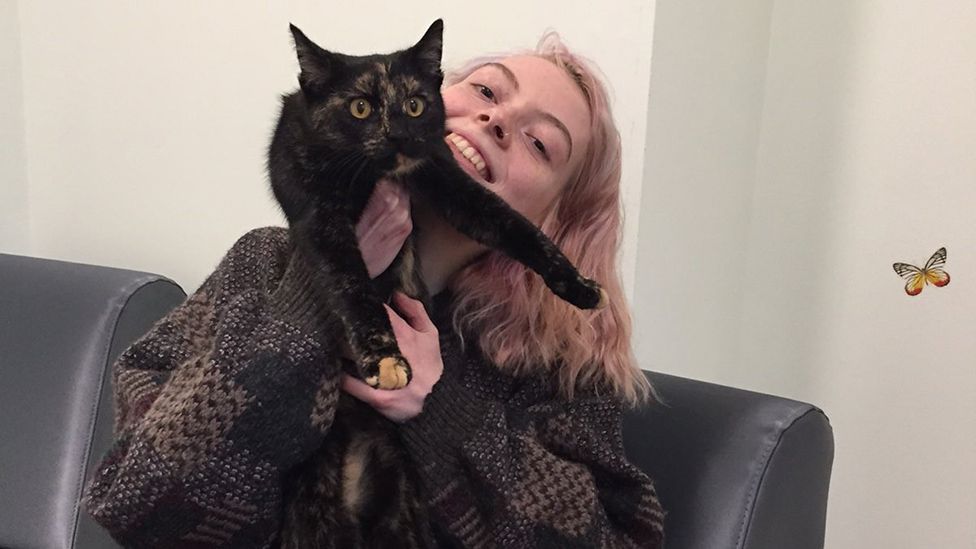Psychiatric patients denied period products 'for safety reasons'
- Published

Hat has been conducting research into people's experiences on mental health wards
Psychiatric patients are being denied access to period products in secure units, a new report , externalhas found.
Hat, 26, said they had to wear the same pad for days or put tissue in their pants after staff refused items for "safety reasons".
Their study into patients' experiences has been backed by the National Survivor User Network.
The NHS said it: "expects all hospitals to give patients access to the essentials of daily life."
Hat, who uses gender neutral pronouns, felt compelled to do their own research after a "humiliating" stay in a psychiatric ward.
Hat, from Weston-super-Mare, said that in some of the hospitals they were in staff would "lock away" tampons and pads, citing safety.
"It meant I'd resort to using tissue in my pants, or wearing the same pad for days," they said.
'Prioritising dignity'
Hat has now created guidelines, which are being endorsed by several mental health and period charities and the Royal College of Occupational Therapists.
They include provision of appropriate products and information, prioritising a patient's dignity - particularly when balancing safety - and also providing support for period pain.
Hat will also be presenting their findings at an event about period equality in parliament this week, organised by the charity Bloody Good Period.
While conducting their report, Hat said the consistency of patients' experiences was "striking" and the main findings were that patients were not supported while on their period.
The research also involved speaking to staff, some of whom acknowledged it wasn't something they'd thought about before.
Patients said sanitary products were locked away "for safety reasons"
Rachel Grocott, chief executive of the Bloody Good Period, said the charity has heard a lot about this issue in the last few years.
"Periods just aren't being factored in to how people are looked after in that healthcare setting and that's something we see repeatedly in so many different parts of our society," she said.
Responding to the research, she added: "I really hope this will just help to meet the basic needs of women and people who menstruate, who also need psychiatric healthcare.
"I don't think anybody should be worrying about their period on top of that."
Mental health hospitals have various rules in place for safety reasons.
'Dehumanising'
These can include limited access to certain items, restrictions on patients leaving wards and lists of what visitors can bring in.
But NHS guidance states that period products should be available to anyone who needs them.
Many of the people Hat spoke to found this wasn't the case.
Eleanor is 21 and recently spent time in a mental health hospital. She welcomed the research as "essential" based on her experience.
Eleanor, pictured after being discharged from hospital, says limited access to period products on wards has negatively affected her
"I have been denied access to products, I've been denied access to underwear and I have experienced extremely restrictive practice.
"I'd have two or three people watching me changing and even though I know it's for my own safety, it's dehumanising," she said.
Like Eleanor and Hat, Sophina has also spent time in mental health hospitals.
She recalled one time on a ward where she asked for sanitary products and was taken by two female staff members to her bed area and was told she had to "prove" she was on her period.
"I had to pull down my trousers and my knickers, and I was quite shocked at the time but you can't really question it, because you don't have any power in that situation.
"It's only with hindsight when you can look back and I think, okay, no, that was wrong, and that probably shouldn't have happened."
Sophina took part in Hat's research and was also part of a focus group to develop guidelines for hospitals, which she hopes will highlight the issue patients are facing.
NHS England announced in 2019 that period products would be available to all patients who need them.
Shortly after, the NHS in Wales announced the same, with Scotland and Northern Ireland also doing this from 2022.
An NHS England spokesperson said it expects "all hospitals to give patients access to the essentials of daily life, including sanitary products.
"All patients should be able to request pads and tampons and not face additional stress and worry during what is already a stressful time."
Chris Dzikiti, director of mental health at the Care Quality Commission - which regulates mental health services - said "we look at whether people's human rights are being respected throughout their care.
"Access to period products is an important part of a person's rights to privacy and dignity.
"The National Survivor User Network is doing great work in this area and we welcome their research."
Hat hopes this report will make a positive difference for patients in psychiatric hospitals.
"As well as having these guidelines, I want it to highlight the need for this conversation for services and also for patients," they said.
"We deserve so much better."
Follow BBC West on Facebook, external, X, external and Instagram, external. Send your story ideas to: westinvestigations@bbc.co.uk, external
Related Topics
- Published16 October 2023
- Published26 May 2023
- Published10 March 2022
- Published30 January 2022